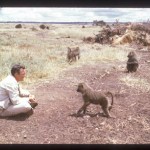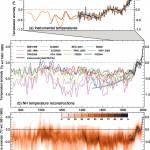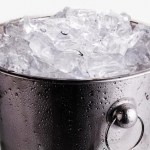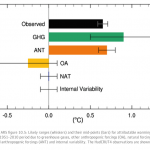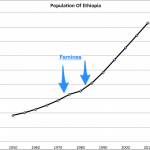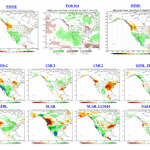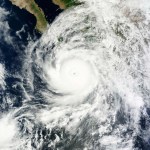
I heard yesterday that my friend and former advisor Irven DeVore died. He was important, amazing, charming, difficult, harsh, brilliant, fun, annoying. My relationship to him as an advisee and a friend was complex, important to me for many years, and formative. For those who don't know he was instrumental in developing several subfields of anthropology, including behavioral biology, primate behavioral studies, hunter-gatherer research, and even ethnoarchaeology.
He was a cultural anthropologist who realized during his first field season that a) he was not cut out to be a cultural…
I recently reviewed Climate Smart and Energy Wise by Mark McCaffrey. The National Center for Science Education is giving away a free chapter, as a PDF, of this book. CLICK HERE TO GET IT.
Also, there is an event coming up. CLEAN Call: Climate Smart & Energy Wise Book Preview with Mark McCaffrey. Click through to get details and participate.
Who is Steve McIntyre? From DeSmogBlog.com:
Stephen McIntyre has been a long-time mining industry executive, mostly working on the “stock market side” of mining exploration deals. He published a blog called Climate Audit where he attempts to analyse in sometimes long and extensive detail the work of climate change scientists where he documents “statistical mistakes” in peer-reviewed scientific literature. ...
McIntyre has been described as a “persistent amateur who had no credentials in applied science before stepping into the global warming debate in 2003” and has been a prominent critic of…
I am going to try to keep all the climate science ice bucket challenges here as they occur. At present there are quite a few individuals who have not yet answered the challenge. I'm sure they will. Some of them, in the Northern Hemisphere, may be waiting for it to get colder so the act becomes more meaningful.
Anyway, here's what we've got now. If I'm missing someone, please add a link in the comments!
It all started with Andy Lee Robinson "Arctic Sea Ice Death Spiral" challenge...
Andy donates to the Dark Snow Project and the Climate Science Legal Defense Fund, challenges David Rose,…
Not really a fully fledged blog post, just a quick link pointing you to something interesting.
More than 100%? Sounds funny, doesn't it? Let me rephrase. Humans have caused so much climate change that some of the climate change changed some of the climate back.
Still sounds kinda funny.
OK, try again: Humans have caused a whole bunch of global warming. Nature has caused a small amount of global cooling, which has offset a little of the human caused global warming. But also, humans have caused a little bit of global cooling as well.
Make sense? OK, look at this graph:
I'm sure you've…
In a recent Wall Street Journal article, Steven Koonin, former Department of Energy Undersecretary and BP scientist makes the case that global warming is caused by humans, important, that we must do something about it, and that further research on key topics is necessary to help guide policy.
He states,
The crucial scientific question for policy isn’t whether the climate is changing. That is a settled matter … We know, for instance, that during the 20th century the Earth’s global average surface temperature rose 1.4 degrees Fahrenheit.
Nor is the crucial question whether humans are…
It has long been known by humans that female mammals can be attracted with the call of a young in distress. There is a famous documentary film of the Hadza, a foraging group in Tanzania, in which this method is used by young boys to trap Dasssies (rock Hyrax). First you catch a baby Dassie (not hard) then you hid and bit it in the neck so it cries out, then when the momma Dassies come to rescue it you shoot them at short range with an arrow or whack them with a stick. Adult Efe Pygmy hunters sometimes imitate the call of a young Duiker (a forest antelope) in distress in order to draw in…
Yes, yes, we hear it all the time: More CO2 is good because plants love CO2
That is a rather dumb thing to say for a number of reasons; nature is not simple. You don't change one variable and expect other variables to respond as though we were turning a garden hose up or down. For example, while plant growth might be enhanced with more CO2 in the atmosphere, there is no reason to think this would be linear, or similar across all plants. You have to dance with the one who brung ya. The plants we have are the plants that have been under Darwinian selection optimizing growth and maintenance…
Just a quick note. The UN Security Council has ad its first ever emergency meeting over a health issue, specifically the current West African Ebola outbreak. From a summary in Science, the Council ...
... unanimously passed a resolution that declared the spread of the virus a “threat to international peace and security” and called on the world to send more health care workers and supplies to Liberia, Sierra Leone, and Guinea, and not to isolate those countries.
...
U.S. Ambassador to the United Nations Samantha Power, who chaired today's meeting, noted that the resolution had 130 co-sponsors…
Climate change may be the existential threat, but underlying this is, of course, population size. And this is a problem that never seems to go away. There are of course two ways, broadly speaking, to limit population growth aside from draconian policies governing reproduction (such as China's One Child policy). One is sometimes called the demographic transition. This is when a combination of factors including so-called modernization which may involve increase quality of health care in combination with increased social equality lead to lower birth rates. The other is when things go badly…
The Polar Vortex hurt. We who lived in it, through it, with it, are like farm animals that got zapped by the electric fence a couple of times ... notice all that long grass growing by the fence. Stay away. It hurt! So we are worried that this will happen again.
It is a reasonable worry, from a scientific point of view. The Polar Vortex visitation last winter was the result of changes to trade winds and jet streams that has characterized our weather for the last few years. One of the big questions on my mind is this: Are wavy jet streams and corresponding changes in the distribution of…
The Open Atmospheric Society
Climate science pseudo-skeptic Anthony Watts recently bought and registered the domain "theoas.org" and has just announced the formation at that Internet address of a new society explicitly designed to organize people in meteorology and related areas intent on opposing the scientific consensus on climate change. And yes, there is a scientific consensus on climate change.
Dr. Roy Spencer once said to me that trying to organize climate skeptics would be like “trying to herd cats”. While this Society is not trying to “herd” anyone, nor is it specifically focused on…
Check this out:
PennFuture is hosting a Twitter chat with renowned Penn State climate scientist (and our good friend!) Michael Mann aka @MichaelEMann on Wednesday, September 17, from 2pm-3pm EDT. Use the hashtag #AskDrMann to participate. You won't wanna miss it!
Mann has been at the forefront of the climate change conversation over the past decade, from his widely-recognized research to his many media appearances explaining the science behind global warming.
He recently penned an op-ed in the Allentown Morning Call, where he urged the public to become more involved in the climate debate,…
I've been collecting information on this topic for a while, and yesterday, I sat down to write a post that would clarify the question of the impacts of windmills on bird populations. It turns out, however, that I was totally unsatisfied with the available data on everything from windmills to building strikes to cats, so instead I wrote a post making that very point: We really have no idea. This is an interesting and important problem, though, so it is worth having a conversation about.
The post is here: "How many birds are killed by windmills and other green energy projects?"
Odile was the strongest hurricane to strike the Baja Peninsula during the period of available data, roughly similar to Hurrican Olivia (1967). The storm reached Category 4 strength but was then weakened because of interaction with the effects of a prior hurricane in the area (Norbert). At the moment, Odile is a tropical storm and still in the Baja. There was flooding, and two fatalities, including a lightning strike and a nine year old boy taken by floodwaters. Several building in Acapulco were damaged. There has been a lot of damage and disruption in the Baja region.
Tropical Storm Polo…
According to data just updated by NASA, last August was the warmest August for the entire instrumental data record, which begins in 1881. This has been something of a mixed year but overall warm. Of the 134 years for which there are data, the coolest month this year so far was February, at 17th place, with July also being cool, at 11th place. Keep in mind this is over 134 years. For the months of January through August, there are no one-digit ranks (1 through 8) prior to 1989, inclusively, and you don't really start getting consistent "top ten" ranks until 1998.
Monthly ranks so far this…
